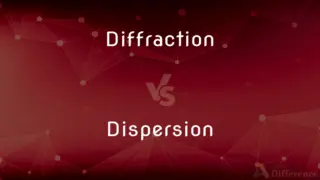Reviewee vs. Review — What's the Difference?
Edited by Tayyaba Rehman — By Maham Liaqat — Updated on April 8, 2024
Reviewee refers to the person being reviewed, focusing on their performance or work, while a review is an evaluation or critique of a service, product, or performance.

Difference Between Reviewee and Review
Table of Contents
ADVERTISEMENT
Key Differences
A reviewee is an individual or entity subjected to evaluation, focusing on their performance, work, or characteristics. Reviews, on the other hand, are assessments or critiques conducted by others to evaluate various aspects such as quality, performance, or satisfaction.
While a reviewee is often involved in processes like employee evaluations, academic assessments, or performance appraisals, reviews are found in diverse contexts including product critiques, service evaluations, and performance feedback in arts and entertainment.
The role of the reviewee is passive, being the subject of evaluation, whereas the creation of a review is an active process involving analysis, judgment, and often, recommendation.
Reviewees are directly affected by the outcomes of reviews, as these evaluations can influence their career progression, reputation, or personal development. Reviews, however, serve a broader audience, providing valuable insights to potential consumers, stakeholders, or peers.
The reviewee stands at the focal point of an evaluative process, while reviews serve as a bridge between the subject being evaluated and the audience seeking information or insight.
ADVERTISEMENT
Comparison Chart
Definition
An individual or entity being evaluated.
An evaluation or critique of a subject.
Role
Passive; subject of evaluation.
Active; process of analyzing and judging.
Context
Often found in employee and academic assessments.
Used in evaluating products, services, and performances.
Impact
Directly affects career, reputation, or development.
Influences consumer choices and perceptions.
Purpose
To be assessed for performance or qualities.
To provide insight, critique, or recommendation.
Compare with Definitions
Reviewee
An artist receiving feedback on their exhibition.
The reviewee discussed the critiques with the gallery owner after the show.
Review
A critique of a new restaurant's menu and service.
The review praised the innovative dishes but noted slow service times.
Reviewee
A student whose academic work is being graded or critiqued.
As a reviewee, she awaited feedback on her thesis from the examination board.
Review
A summary and critique of a theatrical performance.
The review commended the actors’ performances but found the direction lacking.
Reviewee
A company being evaluated by a regulatory body.
As the reviewee, the company complied with all requests for documentation.
Review
An analysis of a latest smartphone model.
The review highlighted the phone’s camera improvements but criticized its battery life.
Reviewee
An employee being assessed for their annual performance.
The reviewee prepared a portfolio of their work to present during the performance evaluation.
Review
An academic critique of a scholarly article.
The review suggested further research was needed to support the article's conclusions.
Reviewee
A candidate in a job interview process.
The reviewee answered questions thoughtfully, hoping to impress the hiring committee.
Review
A consumer's feedback on a purchased product.
The review mentioned that the blender was powerful yet surprisingly quiet.
Reviewee
One who undergoes a review.
Encourage the reviewee to do most of the talking.
Review
A review is an evaluation of a publication, service, or company such as a movie (a movie review), video game (video game review), musical composition (music review of a composition or recording), book (book review); a piece of hardware like a car, home appliance, or computer; or softwares such as business software, sales softwares; or an event or performance, such as a live music concert, play, musical theater show, dance show or art exhibition. In addition to a critical evaluation, the review's author may assign the work a rating to indicate its relative merit.
Review
To look over, study, or examine again
Reviewed last week's lesson.
Review
To consider retrospectively; look back on
Reviewed the day's events.
Review
To examine with an eye to criticism or correction
Reviewed the research findings.
Review
To write or give a critical report on (a new work or performance, for example).
Review
(Law) To evaluate (a decision made by or action taken by a lower court) to determine whether any error was made.
Review
To subject to a formal inspection, especially a military inspection.
Review
To go over or restudy material
Reviewing for a final exam.
Review
To write critical reviews, especially for a newspaper or magazine.
Review
A reexamination or reconsideration.
Review
A retrospective view or survey.
Review
A restudying of subject matter.
Review
An exercise for use in restudying material.
Review
A report or essay giving a critical estimate of a work or performance.
Review
A periodical devoted to articles and essays on current affairs, literature, or art.
Review
An inspection or examination for the purpose of evaluation.
Review
A formal military inspection.
Review
A formal military ceremony held in honor of a person or occasion.
Review
(Law) An evaluation conducted by a higher court of a decision made or action taken by a lower court to determine whether any error was made.
Review
A musical show consisting of often satirical skits, songs, and dances; a revue.
Review
A second or subsequent reading of a text or artifact in an attempt to gain new insights.
I need to make a review of the book before I can understand it.
Review
An account intended as a critical evaluation of a text or a piece of work.
The newspaper review was full of praise for the play.
Review
(legal) A judicial reassessment of a case or an event.
The victims demanded a full judicial review of the case.
Review
A stage show made up of topical sketches etc.
The Cambridge Footlights Review launched many Monty Python faces.
Review
A survey of the available items or material.
The magazine contained a review of Paris restaurants.
Review
A periodical which makes a survey of the arts or some other field.
The Times Literary Review is published in London.
Review
A military inspection or display for the benefit of superiors or VIPs.
The troops assembled for a review by the Queen.
Review
A forensic inspection to assess compliance with regulations or some code.
The regulators demanded a review against NYSE practices.
Review
To survey; to look broadly over.
Before I tackle the question directly, I must briefly review historical approaches to the problem.
Review
To write a critical evaluation of a new art work etc.; to write a review.
The critic reviews every new play in London.
Review
To look back over in order to correct or edit; to revise.
Review
To look over again (something previously written or learned), especially in preparation for an examination.
Review
(obsolete) To view or see again; to look back on.
Review
(obsolete) To retrace; to go over again.
Review
To view or see again; to look back on.
Review
To go over and examine critically or deliberately.
Review
To retrace; to go over again.
Shall I the long, laborious scene review?
Review
To look back; to make a review.
Review
A second or repeated view; a reëxamination; a retrospective survey; a looking over again; as, a review of one's studies; a review of life.
Review
An examination with a view to amendment or improvement; revision; as, an author's review of his works.
Review
A critical examination of a publication, with remarks; a criticism; a critique.
Review
A periodical containing critical essays upon matters of interest, as new productions in literature, art, etc.
Review
An inspection, as of troops under arms or of a naval force, by a high officer, for the purpose of ascertaining the state of discipline, equipments, etc.
Review
The judicial examination of the proceedings of a lower court by a higher.
Review
A lesson studied or recited for a second time.
Review
A new appraisal or evaluation
Review
An essay or article that gives a critical evaluation (as of a book or play)
Review
A subsequent examination of a patient for the purpose of monitoring earlier treatment
Review
(accounting) a service (less exhaustive than an audit) that provides some assurance to interested parties as to the reliability of financial data
Review
A variety show with topical sketches and songs and dancing and comedians
Review
A periodical that publishes critical essays on current affairs or literature or art
Review
A summary at the end that repeats the substance of a longer discussion
Review
(law) a judicial reexamination of the proceedings of a court (especially by an appellate court)
Review
Practice intended to polish performance or refresh the memory
Review
A formal or official examination;
The platoon stood ready for review
We had to wait for the inspection before we could use the elevator
Review
Look at again; examine again;
Let's review your situation
Review
Appraise critically;
She reviews books for the New York Times
Please critique this performance
Review
Hold a review (of troops)
Review
Refresh one's memory;
I reviewed the material before the test
Review
Look back upon (a period of time, sequence of events, etc.); remember;
She reviewed her achievements with pride
Common Curiosities
Can a reviewee benefit from a review?
Yes, reviewees can gain insights, feedback, and opportunities for improvement from reviews.
How does a reviewee participate in the review process?
A reviewee is the subject of the review, providing necessary information or performances for evaluation.
What is a reviewee?
A reviewee is a person or entity being evaluated or reviewed.
What constitutes a review?
A review is an evaluation, critique, or analysis of a service, product, or performance.
Who typically writes reviews?
Reviews can be written by critics, consumers, peers, or professionals specialized in the subject matter.
Do all reviewees receive a review?
In many evaluative contexts, yes, but the scope and nature of the review can vary widely.
Is a self-review considered a review?
Yes, self-reviews are reflective evaluations but lack the external perspective of other reviews.
Do reviews require expertise?
Some types of reviews, especially in technical or specialized fields, require expert knowledge.
What's the difference between a review and feedback?
Feedback is often direct and personal, while a review is a formal assessment intended for a wider audience.
Are reviews always negative?
No, reviews can be positive, negative, or mixed, depending on the evaluator’s findings.
Can reviews impact a reviewee's career?
Absolutely, especially in contexts like employment or academia.
Are reviews always public?
No, some reviews, like employee performance evaluations, are confidential.
Can a reviewee dispute a review?
Yes, there are often mechanisms in place for reviewees to provide feedback or dispute findings.
How often do reviewees undergo reviews?
The frequency can vary greatly depending on the context, from annual to project-based evaluations.
Can anyone be a reviewee?
Yes, in contexts where evaluation or feedback is applicable, anyone can be a reviewee.
Share Your Discovery

Previous Comparison
Diffraction vs. Dispersion
Next Comparison
Lilac vs. VioletAuthor Spotlight
Written by
Maham LiaqatEdited by
Tayyaba RehmanTayyaba Rehman is a distinguished writer, currently serving as a primary contributor to askdifference.com. As a researcher in semantics and etymology, Tayyaba's passion for the complexity of languages and their distinctions has found a perfect home on the platform. Tayyaba delves into the intricacies of language, distinguishing between commonly confused words and phrases, thereby providing clarity for readers worldwide.












































